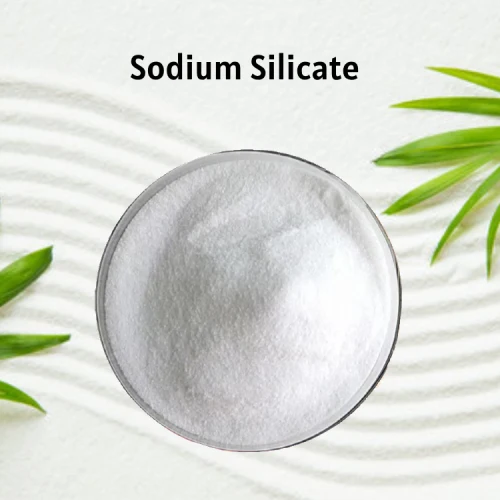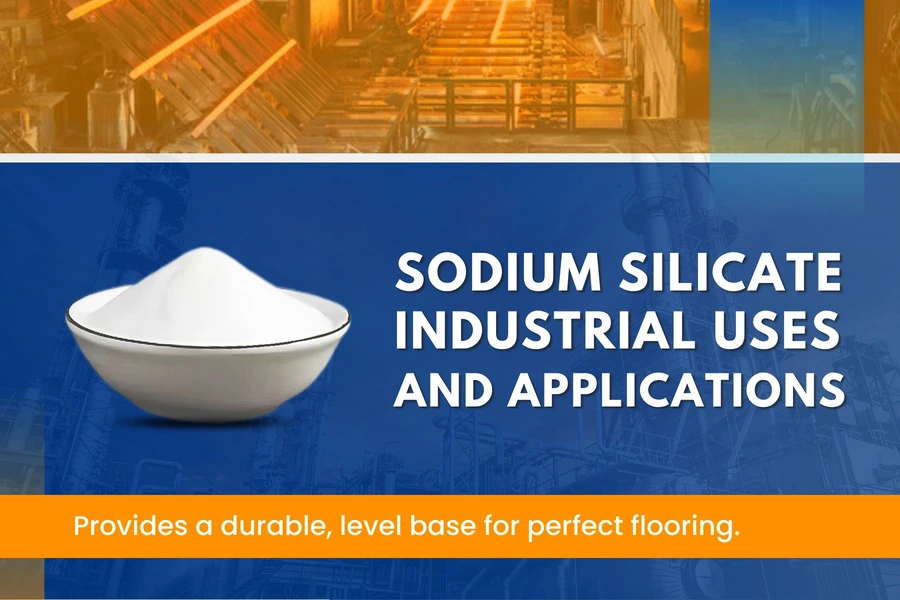Introduction
Sodium silicate, often called water glass, is a multifunctional chemical compound with applications including its adhesive, binding, and cleansing properties.
It is regularly encountered in various everyday products, especially in detergents, of which it is a very vital constituent because of its efficiency in improving cleaning quality.
Table of Contents
Using sodium silicate as a soil stabilizer is important for road pavement and surface integrity. This property is important for ensuring safety and a long-lasting surface, especially in zones exposed to considerable vehicular movement.
In the construction industry, it acts as a hardener, which greatly improves the properties and stability of concrete making it stronger and it finds its manifestation out of the nature of stability.
Apart from applications in construction and automobiles, sodium silicate has also found itself a prime utility in agriculture and horticulture. It is widely used as a soil stabilizer and for soil erosion purposes, ensuring healthy soil.
Other uses for sodium silicate include fertilizer and pesticide production, which increase farm yield and promote sustainable agriculture.
In arts and crafts, sodium silicate is held very dear for its many uses for creative projects. It’s also been used in textiles, glass, ceramics, and paper making, its versatility being further underscored by various industrial applications. Besides this, sodium silicate also finds its way into personal care formulations; thus, it is used in everyday life.
Therefore, sodium silicate is not merely a chemical compound; it is an ingredient that fosters functionality and innovation across diverse fields from agriculture to art.
Key Points
In the detergent industry, it breaks down the soil and grease which make cleaning efforts more effective. This means that not only will it bond each two items, but it will also withstand heat very well, which is essential in forming a durable bond with glues and sealers.
This, through removing metals, rusts, and scales, makes purified water, cleaner water, and safer water for us.
Importance of Sodium Silicate in Various Industries
Detergent builder: enhances efficiency and cleaning action at lower temperatures.
Adhesives: Imparts heat resistance and adhesion, alongside being environmentally safe.
Water treatment: Environmentally safer alternatives in the treatment and softening of water.
Some industrial uses:
They are applied as a binding agent in steel casting and foundry for metal casting.
Agriculture: Sodium silicate is known to be used in the making of fertilizers for the stabilization of the soil and pest control.
It contributes to greater strength and durability of construction materials while rendering them resistant to chemicals.
In the automotive industry, it acts as an adhesive and prevents corrosion.
Further Applications:
In chemical processes, it aids in water purification and acts as a catalyst.
Art and crafts: Used in mold making, glass, and art conservation.
In personal care products: Used twofold as a stabilizer and a thickener.
Sodium Silicate’s Importance in Various Fields
Owing to its versatile characteristics, sodium silicate is encountered in various industries and finds special mention in automotive metal casting and engine part repairs because of its high-temperature resistance.
Sodium Silicate || Water Glass: (Industrial and Daily Applications)
In conjunction with the above-mentioned sodium silicate, an important function includes softening water, which keeps soils from redepositing; thus, sodium silicate is a major formulation in the detergent industry. Sodium silicate is very important in the production of ceramics as a dispersant in preventing defects in casting.
As mentioned above and in combination with water, it can seal small radiator leaks; thus, it is a quick and easy way to fix small automotive problems. Sodium silicate finds use in the production of soap, serving as a stabilizer-high-quality goods through emulsions.
Industrial Uses of Salt Silicate
Indeed, there are numerous applications for sodium silicate, also known as water glass. These applications include the following:
Production of detergents
Structural and effective properties of sodium silicate in detergents, corrosion inhibitors, and construction among certain applications. It has a cleansing action for the removal of grease and soil from hard surfaces and for preventing the redeposition of soil from previously cleaned surfaces.
Advantages of Sodium Silicate as a Builder in Detergents: A Review
The laundry detergents have numerous advantages potentially attributable to the incorporation of sodium silicate into their composition. The ability of the sodium salt to react with softeners will flex the surfactants, thus promoting cleaning.
Moreover, the incorporation of sodium silicate into laundry will promote energy conservation and environmental consciousness through improving the efficiency of detergents under low temperatures.
Its alkalinity also helps maintain the optimal pH level for the detergent, thus ensuring stability and its lifetime on store shelves and in consumers’ houses.
Adhesives and Sealants Manufacture
Sodium silicate is selected to produce adhesives and sealants due to its adhesive nature. It gets more appreciation because of its best heat resistance and ability to stick to a wide variety of substrates.
Benefits of Sodium Silicate Adhesives in What is Probably a Sticky Situation
There are innumerable advantages of the use of sodium-silicate-based adhesives. The deep penetration properties and quick setting times give increased bond strength on porous surfaces such as fabric, paper, and wood.
Moreover, sodium-silicate-based adhesives possess good fire retardant and heat resistance properties, which makes them useful in factories or fireproofing applications.
The fact that there are less volatile organic compounds emitted than with solvent-based adhesives enhances their environment-friendliness features further.
Water Treatment Applications
The salt silicate is known to prevent scaling and rusting in the cooling or boiler systems in the water treatment process. Removal of heavy metals from water makes it integral to the wastewater treatment process.

Environmental Benefits of Treating Water with Sodium Silicate
The non-toxic, biodegradable sodium silicate presents an advantage where water treatment is concerned. Different from other conventional chemicals used for softening water or removing the attendant impurities, these are strong acids or chlorine-based compounds.
Such processes are much like various forms of green potable water treatment. The aim of using sodium silicate is to meet these goals while ensuring effective treatment efficiency in line with the green measures lessening chemical pollution of water sources.
Steel Castings and Foundry Processes
Salt silicate offers sand cores and mold binders for metal casting and foundry procedures. It assists in the construction of sturdy, heat-resistant frames for casting.

The Other Applications of Salt Silicate in Agriculture
Then there may be a question about the uses of salt silicate. Let us tell you, this is a substance that does all the functions in agriculture. It matters that much: it helps to stabilize the soil; it helps to keep pests at bay; it matters the most, and it helps to keep the plants happy.
Stabilizing Soil and Control of Dust
Imagine a world without dust and soil erosion from construction and building sites or farm roads. Well, scatter the vision bright and true, because salt silicate makes it possible. Simply put, it stabilizes soil, creates a concrete surface that easily resists dust formation, promotes plant growth, and provides a firm underground for farming liaises.
Production of Plant Food
Sodium silicate is a true game-changer in the production of fertilizer. It increases fertilizers’ efficiency and dependability by improving their security and slow-release residential qualities. It guarantees that our plants get the nourishment they require to thrive by preventing nutrient leaking and improving nutrition accessibility to plants.

Parasite Control and Crop Security
Now, this is where sodium silicate really shines. When applied to plants, it creates a barrier that keeps insects away and stops microbial and fungal infestations.
In addition to reducing the need for chemical pesticides, this all-natural defense response encourages stronger crop development, guaranteeing a bountiful harvest for all.
Application of Sodium Silicate in Building and Structure Products
Just to clarify the discussion on salts of silicate, also known as water glass, in the building and structural products market. This wondrous substance acts as a basic ingredient in concrete.
This gives increased toughness, durability, and chemical deterioration resistance to these concrete products.

Besides that, salt silicate is employed in the thermal management and fire resistance of insulation and fireproofing goods. This should ensure acceptance for its prime role as a finishing and sealing ingredient, providing almost protection against moisture, corrosion, and abrasions.
The Duty of Sodium Silicate in Automotive and Transportation
Let us give a brief explanation of the values attributed to sodium silicate, or water glass, in the car sector.
This is a very useful substance because it helps keep the steel portion of the car engine and air conditioning systems safe from being eaten away because of them; thus the sodium silicate acts as a corrosion-controlled agent in automotive fluids.
Thus, the useful lifetime of these important components of the vehicle may be considerably augmented by improved sodium silicate optimization of motor oils.

It is also used in small amounts to provide strength and durability to various engine and transmission components. Sodium silicate-based adhesives are used for bonding glass and windshields to improve vehicle structural integrity and safety.
To the question using salt silicate for transport and cars, it is obviously an adaptable product for ensuring the durability, functionality, and safety of trucks and thus gains a pivotal position in automotive technology.
Making Uses of Sodium Silicate in the Chemical Market
We hope this will allow us to explain the benefits of sodium silicate. As a stimulant in a variety of chemical reactions, it is undoubtedly one of the most important compounds in the chemical industry.
In the production of silica gel and other compounds, where it serves as a supportive agent and regulates reaction speed, its value is particularly apparent.
Furthermore, salt silicate is essential for the purification and filtration of water, where it is utilized to remove impurities and pollutants to make the water fit for human consumption and commercial use. Its applications are numerous and essential, in fact.
Salt Silicate in Art and Crafts
Please allow us to elaborate on the benefits of salt silicate, or water glass as it is commonly known. This adaptable product has a home in the art and crafts industry, where it is utilized in a wide range of creative projects.
Art preservation and restoration, glass and ceramic production, and mold creation and spreading all benefit from sodium silicate’s unique high properties.
Production of mold and mildew and casting
Sodium silicate is king when it comes to casting and mold manufacture. Its remarkable ability to produce intricate and accurate mold and mildews is unparalleled. Usually combined with plaster or silica sand, it forms a mold that is effective at withstanding heat and producing accurate spreads for sculptures, priceless jewels, and other artistic items.
Glass and Ceramic Manufacturing
Salt silicate is used by both artisans and craftspeople as an adhesive and binder in the production of glass and ceramics. Additionally, it distributes particles in ceramic lusters as a deflocculant, resulting in a smoother and more uniform application. Additionally, it enhances the durability of finished glass and ceramic goods as a protective finishing.
Repairing and conserving art
Sodium silicate is essential for art conservation and restoration. It is the ideal material for restoring and mending delicate or damaged artwork, including paintings, sculptures, and historical artifacts, due to its adhesive and consolidating properties. By doing this, it prolongs their longevity and preserves their architectural integrity.
Sodium Silicate’s Various Applications in Personal Care
You might wonder how sodium silicate is used for personal care? Well, often called “water glass,” sodium silicate is an extremely adaptable active component that can be found in a wide range of particular treatment products.
It serves as a reliable thickening and stabilizing agent in the field of skin care and beauty, contributing to the creation of opulently smooth and velvety textures in lotions, creams, and structures.
Sodium silicate is a common ingredient in mousses, gels, and hair sprays since it works wonders in hair treatment and styling by giving hair volume and grip.
But that’s not all! This extraordinary substance also appears in dental care and personal hygiene goods such as mouthwash and tooth paste, where it serves as a pH buffer and binding agent, assuring the security and functionality of these essential products.
With so many applications and advantages, sodium silicate is a true miracle of the individual treatment world.
FAQS
What is sodium silicate used for?
Applications for sodium silicate, sometimes referred to as water glass, are numerous and include industrial, agricultural, construction, automotive, chemical, art and craft, and personal care. The creation of detergents, adhesives, sealants, water treatment, metal casting, fertilizers, insect control, crop protection, building materials, automobile fluids, chemical catalysts, crafts, and personal care items are among its uses.
What is the agricultural application of sodium silicate?
In agriculture, sodium silicate is used to stabilize soil, reduce dust, produce fertilizer, manage pests, and protect crops. It protects crops from pests and diseases, promotes plant growth, and improves soil quality.
What function does sodium silicate serve in building materials and construction?
Because it increases the strength, durability, and resistance to chemical attack of concrete and cement, sodium silicate is an essential component in the building materials and construction sector. In order to protect against moisture, corrosion, and abrasion, it is also used in the manufacturing of coating and sealing products, as well as fireproofing and insulating materials.
What role does sodium silicate play in the automobile sector?
To enhance the structural stability and safety of automobiles, sodium silicate plays a crucial role in various applications within the automotive industry. First and foremost, it acts as a corrosion inhibitor in automotive fluids. This means it helps protect critical components from rust and degradation, ultimately extending the lifespan of the vehicle and ensuring its reliability.
Additionally, sodium silicate is involved in the manufacturing of various automotive parts and components. Its properties help strengthen these materials, making them more durable and resistant to wear and tear. This contributes significantly to the overall quality and performance of the vehicle.
What uses does sodium silicate serve in the chemical industry?
Sodium silicate is employed in the chemical industry as a catalyst in a number of chemical processes, most notably the synthesis of silica gel and other compounds. In order to eliminate pollutants and impurities from water, it is also essential in the procedures of water treatment and purification.
What role does sodium silicate play in crafts and art?
Sodium silicate is utilized in the art and crafts sector for the creation of molds and castings, the manufacturing of glass and ceramics, and the preservation and restoration of artwork. Because of its special qualities, it can be used in a variety of artistic and creative activities.
What uses does sodium silicate have in personal hygiene products?
Numerous personal care products, such as those for skincare, cosmetics, hair care, styling, and dental care, use sodium silicate as a flexible ingredient. It helps preserve the stability and efficacy of these products by functioning as a thickening agent, stabilizer, and pH buffer.
Sandip Agrawal, Polymer Engineer and MD of Sakshi Chem Sciences Pvt. Ltd., leads innovation in construction chemicals, shuttering oils, and industrial lubricants. With expertise in polymer science and eco-friendly solutions, he drives R&D and sustainable advancements, ensuring high-performance products for India and global markets.


